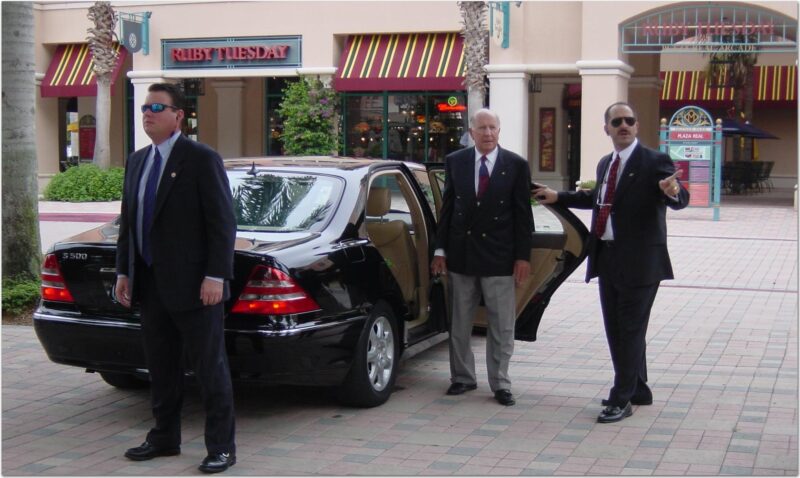In the ever-evolving landscape of personal security, the journey from a security guard to an executive protection specialist is not merely a transition; it’s a transformative voyage that merges vigilance with expertise. While a security guard lays the foundation—monitoring premises, ensuring the safety of property and persons—an executive protection specialist takes on a more dynamic role, intricately weaving risk assessment, advanced tactical training, and refined interpersonal skills into their daily routine.
This ascent demands more than just a uniform change; it requires a steadfast commitment to mastering the art of protection in a world where threats are often shadowy and unpredictable. For those who dare to follow this path, the rewards are substantial, offering a chance to safeguard the lives of influential individuals while embracing the thrill of high-stakes scenarios.
As we delve into this field, we explore the skills, mindset, and experiences that shape this remarkable career transformation.
The Role of a Security Guard: Skills and Responsibilities

The role of a security guard is multi-faceted, requiring a diverse skill set and a keen sense of responsibility. At the core, security guards must be vigilant observers, able to assess situations quickly and accurately.
Their duties range from patrolling designated areas and monitoring surveillance systems to conducting checks and responding to alarms or incidents. Effective communication and interpersonal skills are vital, as they often interact with the public, building relationships while also de-escalating potential conflicts.
Additionally, knowledge of emergency procedures, including first aid and emergency evacuation plans, is essential, transforming what might seem like a straightforward job into a complex tapestry of responsibilities. A successful security guard thrives under pressure, maintains a strong ethical stance, and is always prepared for the unexpected, paving the way for a potential transition into more specialized roles like executive protection.
Gaining Experience: Transitioning from General Security to Executive Protection

Gaining experience is a pivotal step for any security professional aspiring to transition from a general security role to the specialized field of executive protection. While the foundational skills acquired as a security guard—such as surveillance, conflict resolution, and effective communication—are invaluable, the leap requires a dedication to mastering new competencies.
Imagine navigating a high-stakes environment where quick decision-making can save lives. It’s not just about monitoring a crowd anymore; it’s about anticipating threats, understanding close-quarters tactics, and developing a nuanced intuition for detecting danger before it manifests.
Opportunities abound in various settings, from volunteering for security details at high-profile events to seeking mentorship under seasoned executive protection specialists. Each experience enriches the resume, transforming routines into vital learning moments that hone the skills necessary for protecting high-level individuals.
As you unravel the intricacies of this challenging yet rewarding field, remember that every encounter can be a stepping stone, each situation a lesson in vigilance, strategy, and assertive action.
Tools of the Trade: Technology and Equipment Used in Executive Protection

In the high-stakes world of executive protection, the right tools and technology are not just enhancements—they’re lifelines. Modern bodyguards equip themselves with an array of cutting-edge devices, from encrypted communication systems that ensure secure messaging to advanced surveillance equipment capable of monitoring threats from miles away.
A seasoned executive protection specialist might utilize a concealed earpiece for real-time updates while navigating through crowds, or rely on GPS tracking to monitor a client’s movements, ensuring every route is optimal and safe. High-tech options extend to personal defense tools, including discreet self-defense gadgets designed to neutralize threats without drawing too much attention.
Yet, amidst this arsenal of technology, there’s an irreplaceable value in traditional skills: keen situational awareness and intuitive judgment can often make the difference between a safe passage and a potential crisis. The blend of sophisticated gear with sharp instincts forms the cornerstone of effective executive protection, where every decision counts and every second matters.
Conclusion
In conclusion, transitioning from a security guard to an executive protection specialist represents a significant and rewarding career evolution that emphasizes the importance of specialized training and professional development. As individuals navigate this transformative journey, they gain valuable skills and knowledge that enhance their effectiveness in safeguarding high-profile clients.
Institutions like Pacific West Academy play a vital role in equipping aspiring specialists with the necessary training, tools, and insights to excel in this competitive field. With dedication and perseverance, those who embark on this path can achieve not only personal fulfillment but also the opportunity to make a meaningful impact in the world of security and protection.


